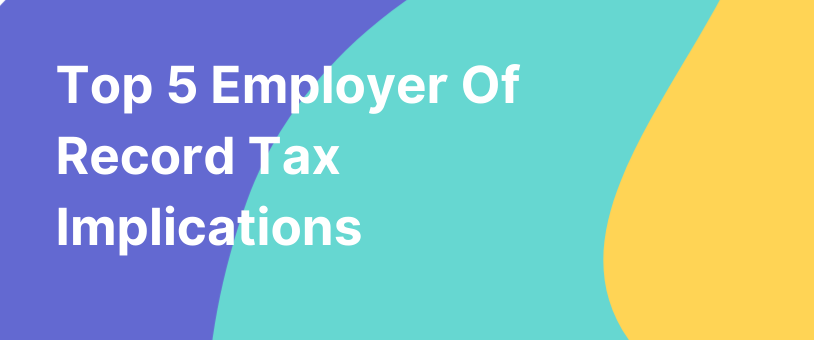If you’re considering partnering with an employer of record and researching tax implications, here are the 5 most common tax implications to take into consideration:
- Your company will not be responsible for withholding taxes from the employee’s pay or submitting them to the appropriate tax authorities. This will be the responsibility of the employer of record.
- Your company will not be responsible for paying employment taxes for the employee. This will also be the responsibility of the employer of record.
- Your company will not be required to report the employee’s income to the Internal Revenue Service (IRS) or the state or local tax agency.
- Your company will not be responsible for providing employee benefits, such as health insurance or retirement plans, to the employee.
- Your company may be subject to taxes or fees for using an employer of record.
It is important to note that your company will still be responsible for complying with any other legal obligations related to the employment of the individual, such as providing a safe and fair workplace and complying with labor laws. It is always a good idea to consult with a tax professional or refer to the IRS website for more information on the specific tax implications that may apply to your situation.
1. You won’t be responsible for withholding taxes from the employee’s pay or submitting them to the appropriate tax authorities
Make sure to review and understand the terms of the agreement with the employer of record to ensure that they are fulfilling their responsibilities related to tax withholding and reporting.
If the employer of record fails to properly withhold and submit taxes, the employee and the company may be held responsible for any unpaid taxes.
Even when working with an EOR, it’s good to have a clear understanding of your own tax obligations as an employer.
2. You won’t be responsible for paying employment taxes for the employee
Review the agreement with the employer of record to ensure that they are fulfilling their responsibilities related to employment taxes.
If the employer of record fails to pay the correct employment taxes, the employee and your company may be held responsible for any unpaid taxes.
It’s good to understand your own obligations related to employment taxes when working with an EOR, such as paying self-employment taxes if applicable.
3. You won’t be required to report the employee’s income to the Internal Revenue Service (IRS) or the state or local tax agency
Even though everything will be in the hands of your EOR, It’s a good idea to keep accurate records of the employee’s pay and any company-provided benefits for tax reporting purposes.
If the employee’s income is not properly reported, the employee and the company may be subject to penalties and fines.
It’s best to consult with a tax professional to fully understand the reporting requirements for your employee’s income.
4. You may not be responsible for providing employee benefits, such as health insurance or retirement plans
This depends on the EOR provider you’re working with. In many cases, the EOR will have solutions for offering your employees benefits, health insurance, retirement plans, and other perks.
If your EOR is taking care of these aspects, it’s best to clearly communicate with your employees about what benefits they will be receiving and who is responsible for providing them. Review the terms of the agreement with the employer of record to ensure that they are fulfilling their responsibilities related to employee benefits.
You should also seek feedback on your EOR’s benefits. If the employee is not satisfied with the benefits provided by the employer of record, they may become disengaged or seek employment elsewhere.
To improve your offering, consider adding other types of benefits that may be attractive to employees, such as professional development opportunities or flexible work hours.
5. Your company may be subject to taxes or fees for using an employer of record
Review the terms of the agreement with your employer of record to understand any additional taxes or fees that your company may be responsible for.
If the company fails to pay the appropriate taxes or fees, they may be subject to penalties and fines.
Consult with a tax professional to understand the full range of tax obligations related to using an employer of record.
Additional tax considerations
- Your company may be required to pay taxes on any company-provided benefits that are given to the employee.
- Your company may be required to report the value of any company-provided benefits to the IRS or other tax agencies.
- Your company may be subject to state or local taxes or fees for using an employer of record.
- Your company may be required to report the employee’s income to the IRS or other tax agencies for purposes other than tax withholding, such as calculating taxes on company-provided benefits.
It’s always a good idea to carefully review the terms of the agreement with the employer of record and consult with a tax professional to ensure that all tax obligations are being properly addressed.
How working for an employer of record affects employees personal income tax
If your employer has hired you through an employer of record, the company will be responsible for withholding taxes from your pay and submitting them to the appropriate tax authorities on your behalf. This means that the employer of record will report your income to the Internal Revenue Service (IRS) and the state or local tax agency, and will pay the appropriate employment taxes.
It is important to note that you will still be responsible for paying your personal income taxes on the income that you earn, even if it is paid through an employer of record. You should also be aware that you may be subject to state and local taxes, as well as federal taxes, depending on the location in which you are working.
Recommended EORs
If you’ve decided you need an EOR and you have learned about the things an EOR will help you with, as well as any potential risks or tax implications, we recommend the following platforms:
Remote is a robust and modern platform for remote-first teams. EOR, contractor management, payroll, benefits, and more.
Oyster is an intuitive platform that allows you to hire, pay, and care for a global team in more than 180 countries. EOR, contractor management, payroll, benefits, and more.
TFY has features for applicant tracking, freelance management, payroll, and more in a single platform. The platform supports diversity hiring and Corporate Social Responsibility (CSR) initiatives.
Lano is both a B2B & B2C platform. Businesses can use it to process global payroll, hire remote talent and manage contractors, while employees and freelancers can benefit from its payslip service, invoicing app, multi-currency wallet, and more.





